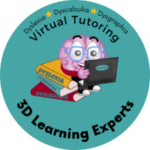Dyslexia is a common learning difference that affects up to 15% of the population. It’s often associated with difficulty in reading, spelling, and writing. However, what many people don’t realize is that Dyslexia can sometimes go undiagnosed, especially in adults who may have developed coping strategies over the years.
If you’ve ever wondered, “Can I be dyslexic and not know it?” the answer is yes.
What is Dyslexia?
Dyslexia is a neurobiological condition that impacts the way the brain processes language. It doesn’t affect intelligence, but it does make reading, writing, and spelling more challenging. Dyslexia varies in severity, and its symptoms can differ from person to person.
Because of this variability, some individuals might not realize they have it, especially if they’ve developed effective coping mechanisms or have avoided situations that challenge their reading and writing abilities.
Signs You Might Be Dyslexic
Many people with undiagnosed Dyslexia are unaware of their condition because they’ve learned to adapt. However, certain signs may indicate that you could be dyslexic:
- Struggles with Reading: You may find reading more exhausting or slower than others.
- Spelling Challenges: Difficulty with spelling even common words can be a red flag.
- Avoidance of Reading and Writing: You might unconsciously avoid tasks that involve reading or writing.
- Memory Issues: Remembering sequences, such as phone numbers or directions, may be more challenging.
- Difficulty with Time Management: Dyslexia can also affect organizational skills and time management.
Quick Checklist for Hidden Dyslexia
- You frequently re-read sentences or paragraphs to understand them.
- You often misspell words or mix up letters (e.g., “b” and “d”).
- You prefer listening to audiobooks or podcasts over reading.
- You avoid reading aloud in public settings.
- You find it challenging to summarize what you’ve read.
Why Dyslexia May Go Unnoticed
Dyslexia can be overlooked for various reasons, particularly if the individual has high intelligence or strong verbal skills. Additionally, the education system and workplace may not always recognize the subtle signs of Dyslexia, especially in adults.
The brain’s remarkable ability to adapt can also mask dyslexic symptoms, leading many to believe their struggles are simply due to a lack of effort or intelligence.
Dyslexia in Families: The Genetic Connection
It’s important to note that Dyslexia often runs in families. If you’re a parent who suspects you might be dyslexic, there’s a higher likelihood that your child could also have Dyslexia.
Early diagnosis and intervention are crucial in helping your child navigate learning challenges more effectively. Seeking a professional assessment not only benefits you but also empowers you to better support your child.
Common Myths About Dyslexia
- Dyslexia is just a reading problem.
- Fact: Dyslexia affects various aspects of language processing, including spelling, writing, and even math.
- Dyslexia only affects children.
- Fact: Dyslexia is lifelong, and its effects can be seen in both children and adults.
- You can’t be successful if you’re dyslexic.
- Fact: Many successful individuals, including CEOs and entrepreneurs, have Dyslexia and have learned to thrive despite the challenges.
Next Steps: Seeking Support for Dyslexia
Recognizing the signs of Dyslexia is the first step toward understanding your unique learning style. Whether you’re a parent concerned about your child’s reading struggles or an adult questioning your own learning challenges, it’s important to seek support.
Dyslexia can often go unnoticed, especially in adults who have developed coping mechanisms. If you suspect you might be dyslexic, remember that you’re not alone, and support is available. Whether through professional assessment or personalized tutoring, there are many resources to help you navigate your learning journey.
If you’re a parent with Dyslexia, seeking a diagnosis and support for both yourself and your child can make a significant difference. Early intervention and the right tools can help your child overcome challenges.
Common FAQ About Dyslexia
Can Dyslexia be diagnosed in adults?
Yes, Dyslexia can be diagnosed at any age. Adult assessments are available and can provide clarity and strategies to manage the condition.
Does Dyslexia affect intelligence?
No, Dyslexia does not affect a person’s intelligence. It simply impacts the way the brain processes language.
What should I do if I think I’m dyslexic?
If you suspect you have Dyslexia, consider seeking an assessment from a qualified professional. This can help you understand your challenges and develop strategies to manage them effectively.
Can Dyslexia be inherited?
Yes, Dyslexia often runs in families. If you're dyslexic, it's possible that your child might also have Dyslexia. Early diagnosis and support are key to helping them succeed.

